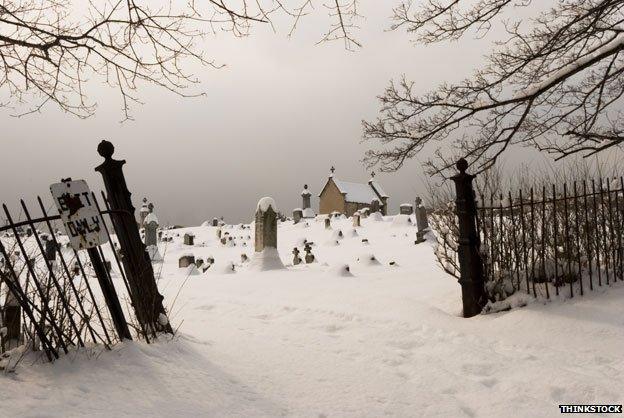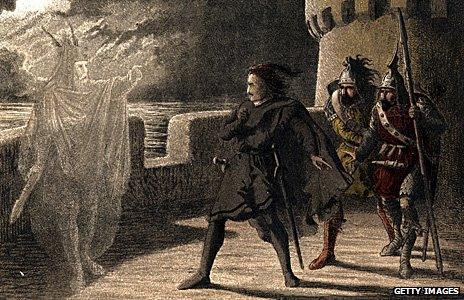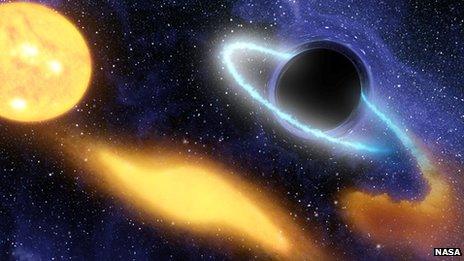A Point Of View: Ghosts in the material world
- Published

John Gray revives the memory of a ghost story to discuss materialism - the theory that only matter exists.
According to a curious, subtle, now largely forgotten writer: "Any event in this world - any human being for that matter - that seems to wear even the faintest cast or warp of strangeness, is apt to leave a disproportionately sharp impression on one's senses."
In contrast, he goes on, "Life's mere ordinary day-to-day - its thoughts, talk, doings - wither and die out of the mind like leaves from a tree. Year after year a similar crop recurs, and that goes too. It is mere debris, it perishes. But these other anomalies survive, even through the cold of age."
These lines come at the beginning of a story by Walter de la Mare, published in 1924, which deals with one of these anomalous experiences. During the later decades of his long life - he was born in 1873 and died in 1956 - de la Mare was a familiar feature of the English literary landscape, a poet and anthologist whose poems were learnt by heart by successive generations of schoolchildren and whose books were widely available in public libraries.
So why is he so little known today? It may be because his work conveys a sense of the insubstantial quality of everyday things, a point of view that runs counter to the prevailing creed of scientific materialism.
At his peak of public recognition, de la Mare was most celebrated as a writer for children, but in nearly everything he wrote he explored experiences of the uncanny. The story from which I've quoted - which is definitely meant for grown-ups - communicates this in an especially intense and concentrated way.
Entitled Winter, the story describes a few moments in a churchyard late on a cold January afternoon in which nothing very definite seems to happen. The church wasn't particularly striking. The traveller who tells the tale describes pausing after long hours of walking in "a mere half-acre of gravestones huddling under their tower, in the bare glare of a winter's day".
With the sky above a bright blue void, the church stood on a hill surrounded by brilliant fields of newly fallen snow. Nothing moved, and no sound broke the frozen hush.
"In surroundings like these, in any vast vacant quiet," the traveller wrote, "the senses play uncommonly queer tricks with their possessor."
Suddenly, after wandering about reading the epitaphs on the graves, the traveller looked up and realises he wasn't alone. On the outskirts of the graveyard he glimpsed a figure, dressed in rich colours, watching him with a gaze that met his own.
The traveller wasn't afraid. What startled him were the arrestingly beautiful, honey-coloured face of the figure that had suddenly appeared - and the look of disbelief in its almost colourless eyes. Looking at him intently, as if the crystalline air of the graveyard was too dense for clear vision, the figure regarded the tired traveller with an expression of astonishment and distaste.
The figure asked the traveller the way, and was directed to the gate that led to the human road. At this point the figure recoiled in horror, and then it was gone. Even in the glittering winter twilight, the human world was too dim and murky a place for the mysterious figure to want to stay.
De la Mare has been described as a writer of supernatural tales, but what is so satisfying about this story is that it leaves the reader in suspense as to what the traveller has seen. When he encounters the visitor, the traveller realises that "this being, in human likeness, was not of my kind, nor of my reality". The figure was "no illusion of the senses". Rather, what the traveller has experienced leaves him with the suspicion the world that's normally given us through the senses may itself be an illusion. No assurances are given him regarding any other world.
Graham Greene - a long-standing admirer and a religious believer - wrote that churches feature in de la Mare's stories as stone memorials of a dead religion. The traveller's epiphany occurs in "a mere half-acre of gravestones", not on sacred ground. The emotion the experience leaves in him is certainly not one of joyous uplift. Instead he feels diminished and bereft, seeing himself - as the visitor may have seen him - as little more than a shadow.
De la Mare has no interest in explaining experiences of the kind his traveller describes. If anything he is suggesting that that they may be finally inexplicable. Of course this goes against the view of things that tells us the universe operates according to fixed and discoverable laws. But it may be worth asking whether this view is as solid as it seems to be.
Materialism - the philosophy, not the perennial human tendency to pursue and accumulate material things - sees the universe as a physical system. Everything that exists in it must be some sort of matter, or something that emerges from matter. In a fully scientific view of the world, only material things are real. Everything else is just a phantom.

Materialists would see the ghost in Hamlet as a figment of the imagination
In this view, science is a project of exorcism, which aims to rid the mind of anything that can't be understood in terms of physical laws. But perhaps it's the dogma of materialism that should be exorcised from our minds. Science is a method of inquiry, whose results can't be known in advance. If scientific inquiry is the most powerful tool for increasing human knowledge, it's because science is continuously changing our view of the world. The prevailing creed of scientific materialism is actually a contradiction, for science isn't a fixed view of things, still less a dogmatic faith.
The belief that the world is composed only of physical things operating according to universal laws is metaphysical speculation, not a falsifiable theory.
We know that physical things aren't as substantial as they seem to us to be. The idea of matter has shifted and changed. The black holes and quantum leaps studied by scientists today would be inconceivable to the materialist philosophers of the ancient world, with their simple notions of indivisible atoms. Nor can the belief that we live in a universe that's everywhere ruled by the same laws be taken for granted.
Perhaps, as cosmologists in ancient India and Renaissance Europe believed and some physicists think today, there isn't only one universe but many, each governed by a different set of laws. Or maybe the world is at bottom chaotic, with what we think are natural laws being only regularities, patterns that appear for a while and then melt away.
The perception we have that the world is governed by fixed laws may have come about because ours is one of the few corners of the universe where conditions are stable enough to have produced observers such as ourselves.

Black holes suck in matter
The distinction between what's natural and what's not isn't as straightforward as it seems. The very idea of a law-governed cosmos may be a relic of monotheism, with natural laws serving the role that divine commands once did. Many religions don't distinguish between nature and the supernatural. For animists and polytheists, the natural world is full of spirits.
Even if there are such things as laws of nature, there's no reason to think they must be accessible to the human mind. What science suggests is the opposite. If our minds evolved by natural selection as Darwin proposed, shaped more by a struggle for survival than by any search for truth, it's highly unlikely that we'll ever fully understand the universe. Almost certainly the world is a far stranger place than humans can possibly imagine.
De la Mare was much too refined and penetrating a mind to imagine that ultimate questions can ever be settled. Instead, he unsettled the reader's view of things while leaving these questions open. His stories suggest that the everyday world contains gaps, anomalies and singularities, which may - or may not - point to a larger reality. The uncanniness of these tales comes from the impression they leave in the reader that our everyday existence is insubstantial and perhaps chimerical.
Materialism asserts that anything apart from physical phenomena is a figment of the imagination - a kind of apparition, which must be exorcised from the mind. It's a very simple-minded philosophy. For de la Mare's traveller, it's not the strange visitor he encounters that's the ghost. It's the ordinary world that surrounds every one of us.
You can follow the Magazine on Twitter, external and on Facebook, external